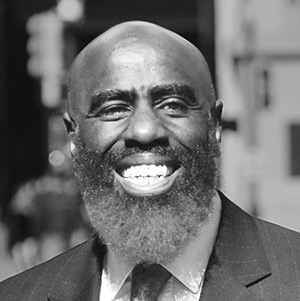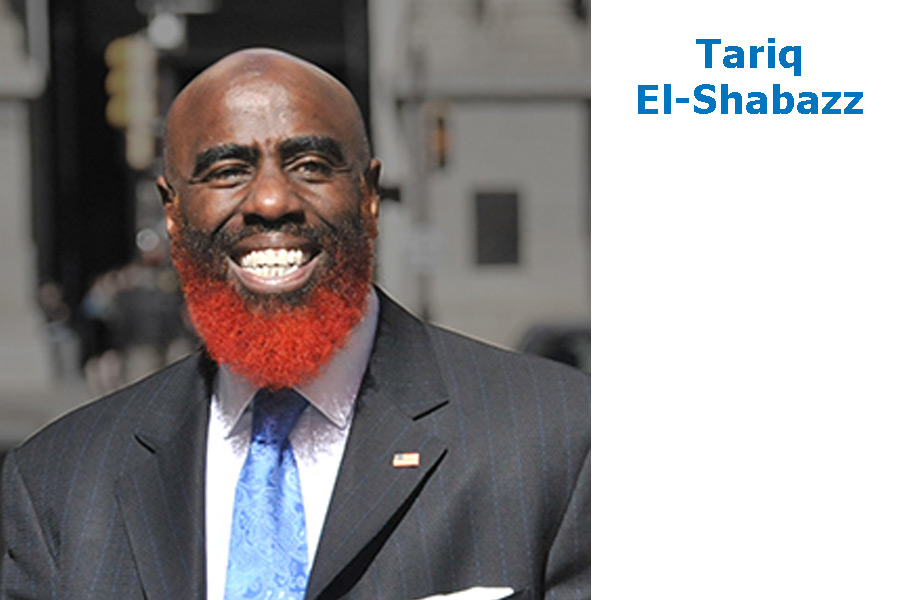Tariq El-Shabbaz hopes to return to the Philadelphia District Attorney’s Office, where he previously served as assistant district attorney for five years. El-Shabbaz currently runs a private-law practice with Richard Harris. Throughout his career, El-Shabbaz led defenses for political figures and workers on both the federal and state levels.
PGN: There have already been nine transgender women of color murdered across the nation this year. If elected, what will your office do to combat violence against transgender individuals in Philadelphia, specifically women of color?
TE: What we need to do in the D.A.’s Office and what I will do in the D.A.’s Office is have diversity in the office that is representative of everyone in the community. I believe that’s important because everyone needs to be able to identify with representatives in the office. We haven’t taken the necessary steps to inform and educate individuals and prioritize homicides. No homicide against any member of our community will be overlooked, no matter what their sexual orientation, their race or country that they came from. We are going to attack all of them the same. We are going to highlight all of them the same.
PGN: If elected, will you assist PGN in our ongoing efforts to settle all open-records litigation for access to Nizah Morris records?

TE: I think it’s important to have transparency in this office. That’s one of the goals of this candidacy and one of the goals of this office. I not only think we should look at opening the records but I think we should open the case, investigate [and] get some fresh eyes on it. I don’t have a problem with it. The only way I would not agree to opening all of the records is if it would compromise the investigation going on now.
PGN: How would you approach racial disparities in both the charging and sentencing processes?
TE: It starts again with diversity. The lack of diversity doesn’t allow representatives of the community we represent to feel comfortable. In order to have a fresh look at how people are arrested, convicted and how victims are treated, we have to have people who speak the same language [or] come from the same areas. Secondly, clean out the office of anyone that has any type of homophobic, transphobic or racist prejudice. We have to make positive steps in hiring, training and weeding out those [prejudices] that exist in that office. I have to have people in the office who want to correct it and who want to inform me of it. If the correct action isn’t taken as swiftly as I want them to, that person can’t work for me.
PGN: What is your position on the current immigration crackdown being led by the Trump administration? What role does the D.A.’s Office play in this process?
TE: The position of me as the chief prosecuting officer of Philadelphia would be as a bully pulpit. I have the ability to align myself with the mayor, attorney general and City Council for sanctuary cities but also to push legislative action to protect individuals that are here legally and are here seeking to be here legally. They should not be abused or imprisoned just because they come from a country Trump doesn’t like. In order to protect our citizens federally, we will have to do it locally. I will absolutely be a voice against any discrimination. I am marginalized and I understand how that feels. I know it affected my family. I’m not going to allow that under my administration to let that marginalization happen to anybody.
PGN: In light of the bribery charges facing our current district attorney, what would you do to root out corruption within the office?
TE: The first thing is from the day I walk in after the inauguration, I am going to put the first policy out and that is going to be zero tolerance for every gift. Even a cup of coffee will be prohibited. Once we are in a position, we can affect change and people’s lives. We have to not be beholden to someone because of a gift or anything you can give them. Secondly, make sure we have ethics training.
PGN: Some organizations have called for the release of data on the number of people of color convicted in Philadelphia each year. Is this something you would support?
TE: I support it from the standpoint that we need to study it. The only time we are going to figure out if we are treating people fairly is to study. It’s OK if we study sometimes and when we study statistics, we can correct it. That’s the whole purpose of doing the study. How can you correct a problem you don’t even acknowledge? So I’m absolutely for having the study.
PGN: What is your position on cash bail?
TE: I am for it. Our studies have shown that there are systems that are working. Everybody cites the D.C. system but the D.C. system is federally funded. It strives on social services. We [can] duplicate that in Philadelphia based upon our financial ability to do it. If we’re not treating the root of the problem, then all we are doing is sending people back into society to again try to feed their habits.
PGN: What is your position on the death penalty?
TE: I’m against it. There are two things that we know from the death penalty so far and the application thereof: 1. It’s disproportionately applied to African-American black and brown people. 2. We have determined and found scientific evidence that sometimes as human beings, we make mistakes. Sometimes, there can be someone who is convicted of homicide and sentenced to death mistakenly. If that person is put to death, how do you rectify it? You can’t. It hasn’t deterred a crime at all.
PGN: Do you think that police violence, specifically against communities of color, is an issue in Philadelphia? If so, what would you do to combat it?
TE: I think it’s an issue around the country and absolutely an issue in Philadelphia and it’s a systemic issue. The only way we are going to combat it is through Commissioner [Richard] Ross, myself as D.A., the Public Defender’s Office and all of our partners working together to weed out the bad police. Prosecute them to the full extent of the law.
PGN: The D.A.’s Office has not had an LGBT liaison since the beginning of 2015. Is this a position you would resurrect?
TE: Absolutely. The D.A.’s Office has to represent the community of the citizens of Philadelphia — every community. If we’re not representative of the LGBT community, then we are not servicing all Philadelphians and that’s a problem.
PGN: Do you support the statewide LGBT nondiscrimination bill? If yes, what would you do to advance it?
TE: I support any nondiscrimination bill. What I will do is enforce an environment in the District Attorney’s Office that is nondiscriminatory. People are not going to be judged based upon their belief system, race, gender, country of origin or whether they are a member of the LGBT community. If I find out that occurred in the office, it will be rectified anywhere from suspension to firing.
PGN: Do you support the statewide hate-crimes bill? If yes, what would you do to advance this measure?
TE: I support it and I want to take it a little further. One of the problems with the current hate-crimes bill is that it’s too weak. It requires certain things to occur in order to even institute it. I think we have to strengthen it even more so with Donald Trump in office. We have to look at how far we go now and how far we need to go to ensure the safety of everyone against hate.
PGN: Until an LGBT-inclusive hate-crimes law is adopted, what do you think can be done to better track and report hate crimes motivated by a victim’s sexual orientation and/or gender identity?
TE: It has to be based upon community relationships and working together. If you have a stake in the District Attorney’s Office, then you and I should be able to communicate. You guys have to work with me and I have to work with you. We have to talk to one another. I have to trust you and you have to trust me. In order to keep the statistics, we have to first communicate because there may be things that are underreported. If it’s underreported, how can I keep track of when the [crime] occurs? If it is reported and we are seeing an up-spike, we can rally the law enforcement that we need to protect the community.
PGN: Why should the LGBT community vote for you?
TE: I understand transparency and I understand the importance of the community knowing exactly what’s going on in that office, exactly what went on with a particular case and why the D.A. made a particular decision. But I also understand that things need to be improved and it can only be improved through reform. It can only happen with someone who understands the workings of that office. There are a lot of people who talk about going there but have no clue how it runs. There’s only one candidate who knows how to manage that office from day one and that’s Tariq El-Shabbaz. The first step we need to lead the D.A.’s Office is to reform the D.A.’s Office with common-sense reform, to keep people safe, to make sure our elderly are protected and our children are protected, to make sure that anyone is treated fairly despite their religion, country of origin, ethnicity, if they’re a member of the LGBT community, despite anything that makes us different from one another — even though we’re all the same.
For more information about Tariq El-Shabbaz, visit www.tariqforjustice.com.
